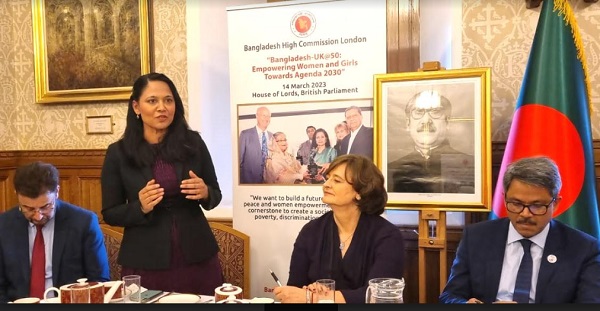Report on Policy Dialogue for Public Funding of Women Candidates in Bangladesh
Event Overview and Key Participants
- Event Title: Public Funding for Women Candidates
- Date: Sunday
- Location: Krishibid Institution, Dhaka
- Organiser: Democracy International (under the B-Space project)
- Sponsor: UKAID
- Chief Guest: Sharmeen S Murshid, Social Welfare and Women and Children Affairs Adviser
- Key Participants: Leaders from political parties, the Election Commission, members of the Women Reform Commission, representatives from Bangladesh Jamaat-e-Islami, July Kanya, media professionals, and civil society leaders.
Proposed Framework and Government Endorsement
A policy dialogue was held to discuss a draft ordinance aimed at establishing a public funding mechanism for women candidates in elections. The key proposals and endorsements are outlined below:
- A draft ordinance was presented by Md Abdul Alim, Country Director for Democracy International.
- The proposed framework is designed to be gender-sensitive, featuring a simplified application process and robust monitoring mechanisms to ensure transparency and accountability.
- Adviser Sharmeen S Murshid welcomed the draft ordinance, highlighting the government’s commitment to advancing women’s empowerment and describing the dialogue as a significant milestone in Bangladesh’s democratic journey.
Alignment with Sustainable Development Goals (SDGs)
The initiative to provide public funding for women candidates directly supports the achievement of several key United Nations Sustainable Development Goals (SDGs), reflecting a national commitment to inclusive and sustainable development.
Advancing SDG 5: Gender Equality
The proposed ordinance is a critical mechanism for achieving the targets set forth in SDG 5, which aims to achieve gender equality and empower all women and girls.
- Ensuring Full Participation: The initiative directly addresses Target 5.5 (Ensure women’s full and effective participation and equal opportunities for leadership at all levels of decision-making in political, economic and public life) by mitigating the financial barriers that disproportionately affect women candidates.
- Promoting Empowerment: By facilitating greater access to political office, the public funding framework empowers women to become active agents of change, contributing to national leadership and policy reform.
- Strengthening Democratic Institutions: International research, as cited by DI Chief of Party Catherine Cecil, confirms that public funding significantly increases women’s political representation, thereby creating a more equitable and representative democratic landscape.
Strengthening SDG 16: Peace, Justice, and Strong Institutions
The dialogue and its outcomes contribute significantly to SDG 16, which focuses on promoting peaceful and inclusive societies for sustainable development, providing access to justice for all, and building effective, accountable, and inclusive institutions at all levels.
- Building Inclusive Institutions: The multi-stakeholder consensus on the ordinance supports Target 16.7 (Ensure responsive, inclusive, participatory and representative decision-making at all levels). The involvement of diverse political parties, the Election Commission, and civil society demonstrates a collective effort to build stronger, more inclusive governance structures.
- Enhancing Transparency and Accountability: The proposed framework includes robust monitoring mechanisms, aligning with Target 16.6 (Develop effective, accountable and transparent institutions at all levels). This ensures that public funds are used effectively and builds public trust.
- Commitment to Implementation: Pledges from political leaders to pass the ordinance and assurances from the Election Commission to enforce it underscore a commitment to strengthening the rule of law and creating effective institutional frameworks for gender equality.
Outcomes and Future Commitments
- Speakers unanimously agreed that the initiative is vital for promoting inclusive and representative governance in Bangladesh.
- Political leaders expressed their support and pledged to work towards refining and swiftly passing the ordinance for implementation.
- The Election Commission provided assurance that it would take effective measures to enforce the law once it is formally adopted.
1. Which SDGs are addressed or connected to the issues highlighted in the article?
The article primarily addresses issues related to two Sustainable Development Goals (SDGs):
- SDG 5: Gender Equality – This is the most prominent SDG, as the article’s central theme is the advancement of women’s empowerment, specifically in the political sphere. The dialogue on “Public Funding for Women Candidates” and the goal to increase “women’s political representation” directly align with achieving gender equality.
- SDG 16: Peace, Justice and Strong Institutions – The article discusses strengthening Bangladesh’s “democratic journey,” promoting “inclusive and representative governance,” and reforming national leadership. These themes are central to SDG 16, which aims to build effective, accountable, and inclusive institutions at all levels. The involvement of the Election Commission and political parties to pass and enforce a new ordinance supports this goal.
2. What specific targets under those SDGs can be identified based on the article’s content?
Based on the article, the following specific targets can be identified:
-
SDG 5: Gender Equality
- Target 5.5: Ensure women’s full and effective participation and equal opportunities for leadership at all levels of decision-making in political, economic and public life.
The article directly supports this target by focusing on a policy initiative—public funding for women candidates—designed to overcome barriers and “ensure equal opportunities for women to move forward” into political leadership roles. The statement that “international research showed public funding significantly increases women’s political representation” reinforces the connection to this target.
- Target 5.5: Ensure women’s full and effective participation and equal opportunities for leadership at all levels of decision-making in political, economic and public life.
-
SDG 16: Peace, Justice and Strong Institutions
- Target 16.7: Ensure responsive, inclusive, participatory and representative decision-making at all levels.
The dialogue itself, which “brought together leaders from political parties, the Election Commission, members of the Women Reform Commission… and civil society leaders,” exemplifies a participatory approach to policy-making. The proposed “gender-sensitive public funding framework” is an initiative aimed at making governance more “inclusive and representative,” as stated by the speakers who agreed it would play a “vital role in promoting inclusive and representative governance.”
- Target 16.7: Ensure responsive, inclusive, participatory and representative decision-making at all levels.
3. Are there any indicators mentioned or implied in the article that can be used to measure progress towards the identified targets?
Yes, the article mentions and implies indicators that can be used to measure progress:
-
For Target 5.5:
- Indicator 5.5.1: Proportion of seats held by women in national parliaments and local governments.
This indicator is implicitly the primary measure of success for the initiative discussed. The article states that the goal of public funding is to “significantly increase women’s political representation.” Therefore, tracking the percentage of women elected to political office after the implementation of the ordinance would be the key metric for measuring progress.
- Indicator 5.5.1: Proportion of seats held by women in national parliaments and local governments.
-
For Target 16.7:
- Indicator (Implied): Adoption and implementation of a legal framework for public funding for women candidates.
While not a formal UN indicator, the article points to this as a direct measure of progress. The article highlights the presentation of a “draft ordinance,” the pledge from political leaders to “pass it swiftly for implementation,” and the Election Commission’s assurance to “take effective steps to enforce it.” The successful adoption and enforcement of this ordinance would serve as a clear indicator of the government’s commitment to making decision-making processes more inclusive and representative.
- Indicator (Implied): Adoption and implementation of a legal framework for public funding for women candidates.
4. Table of SDGs, Targets, and Indicators
| SDGs | Targets | Indicators |
|---|---|---|
| SDG 5: Gender Equality | Target 5.5: Ensure women’s full and effective participation and equal opportunities for leadership at all levels of decision-making in political, economic and public life. | Indicator 5.5.1 (Implied): The proportion of seats held by women in national and local political bodies. The article’s goal is to “significantly increase women’s political representation.” |
| SDG 16: Peace, Justice and Strong Institutions | Target 16.7: Ensure responsive, inclusive, participatory and representative decision-making at all levels. | Indicator (Implied): The successful adoption and enforcement of the “draft ordinance on public funding for women candidates” to create a “gender-sensitive public funding framework.” |
Source: newagebd.net







